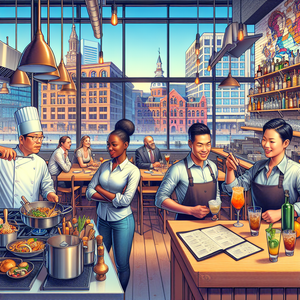
Exploring Career Paths in the Restaurant Industry: A Detailed Guide to Job Roles and Insights
The restaurant industry is a thriving sector that offers a plethora of career opportunities tailored to diverse skills, interests, and career aspirations. As of May 2023, around 13.2 million individuals were employed in this vibrant field, with job growth reflecting its dynamic nature—over 28,000 positions were added in March 2024 alone. This article aims to serve as an engaging guide to the various roles available in the restaurant industry, outlining job responsibilities, requirements, and insights into current trends.
Job Summaries:
Server:
- Servers are the face of customer service in restaurants.
- Responsible for taking orders, serving food and drinks, and ensuring guests have a delightful dining experience.
- This role requires strong communication skills, a friendly attitude, and the ability to thrive in a fast-paced environment.
- Generally, a high school diploma suffices, though experience in hospitality can boost job prospects.
- A successful server can greatly influence customer satisfaction and loyalty, making them an integral part of the restaurant's success.
Line Cook:
- Line cooks play a crucial role in the kitchen, preparing and cooking dishes according to the restaurant’s recipes.
- They must be adept at using various kitchen equipment and maintaining cleanliness while following food safety protocols.
- Culinary skills and attention to detail are paramount, with many employers preferring candidates with culinary school training.
- Line cooks are essential in delivering meals that meet customer expectations and uphold the restaurant’s reputation.
Sous Chef:
- The sous chef supports the head chef in managing kitchen operations.
- Overseeing food preparation and maintaining quality control.
- Training kitchen staff and managing inventory.
- Ensuring hygiene standards are met.
- Strong culinary skills and leadership abilities are crucial.
- Typically requires a culinary degree alongside several years of kitchen experience.
- The sous chef is vital in ensuring kitchen efficiency and food quality.
- Contributes to the overall dining experience.
Restaurant Manager:
- Restaurant managers oversee daily operations, ensuring the establishment runs smoothly and profitably.
- Responsibilities include managing staff, enhancing customer service, and handling financial reporting.
- Strong leadership and organizational skills are essential, often requiring a bachelor’s degree in hospitality or business management alongside industry experience.
- By effectively managing the restaurant, they play a significant role in customer satisfaction and financial success.
Host/Hostess:
- As the first point of contact for guests, hosts and hostesses greet customers.
- Manage reservations.
- Ensure efficient seating arrangements.
- This role demands excellent interpersonal skills.
- Ability to handle inquiries and complaints gracefully.
- A high school diploma is usually needed.
- Professional demeanor is important.
- Their welcoming presence significantly enhances the dining experience.
- Sets the tone for the meal.
Bartender:
- Bartenders create a variety of beverages and cocktails while providing top-notch customer service.
- They are responsible for mixing drinks, taking orders, and keeping the bar area clean.
- Knowledge of drink recipes and strong interpersonal skills are essential.
- A high school diploma and potential bartending experience or certification are required.
- Bartenders significantly contribute to the atmosphere and enjoyment of the dining experience.
Pastry Chef:
- Pastry chefs specialize in crafting desserts and baked goods, showcasing their creativity and technical skills.
- Their duties include designing dessert menus and preparing ingredients.
- A culinary degree focused on pastry arts is often required, along with a solid understanding of food safety practices.
- Pastry chefs enhance the restaurant’s menu, increasing customer satisfaction through delectable offerings.
Dishwasher:
- Dishwashers play a vital role in maintaining cleanliness by washing dishes, utensils, and kitchen equipment.
- This entry-level position requires stamina and efficiency, with no formal education typically necessary.
- A willingness to learn and work as part of a team is essential.
- Dishwashers support kitchen operations, ensuring a smooth workflow during busy service hours.
Culinary Director:
- Culinary directors oversee culinary operations for restaurants or groups.
- Setting standards for food quality and menu design.
- They hire and train kitchen staff.
- Develop recipes and ensure compliance with health regulations.
- This high-level position necessitates a culinary degree and extensive industry experience.
- Culinary directors shape the restaurant's brand identity through innovative menu concepts and quality control.
Sommelier:
- Sommeliers specialize in wine selection and food pairing, enhancing the dining experience with their expertise.
- They manage wine inventory, create wine lists, and educate both staff and customers about wine.
- A deep understanding of wine regions and varietals is crucial, often requiring certification from a recognized institution.
- Their knowledge significantly elevates service quality and customer satisfaction.
Kitchen Manager:
- Kitchen managers oversee kitchen operations, ensuring food preparation meets safety and quality standards.
- They manage staff, order supplies, and maintain inventory.
- Strong culinary skills and leadership abilities are essential, along with a high school diploma or culinary degree.
- Kitchen managers are crucial for maintaining an organized kitchen, which directly impacts restaurant efficiency and guest satisfaction.
Food Runner:
- Food runners assist servers by delivering food and beverages from the kitchen to the dining area.
- They ensure timely service and help set up tables, maintaining cleanliness.
- Good communication and efficiency in a fast-paced environment are necessary.
- While no formal education is required, previous experience in food service can be beneficial.
- Food runners enhance the dining experience by ensuring timely delivery.
General Manager:
- General managers oversee all aspects of restaurant operations, including finance, staffing, and customer service.
- They develop strategies to improve efficiency and profitability while ensuring compliance with health regulations.
- Typically, a degree in business or hospitality management is required, along with years of experience.
- General managers play a pivotal role in shaping the restaurant's atmosphere and overall performance.
Food and Beverage Manager:
- Food and beverage managers oversee dining options, ensuring quality service and product offerings.
- Responsibilities include menu planning, staff management, and budgeting.
- Strong leadership and organizational skills, along with a hospitality background, are essential.
- A bachelor’s degree in hospitality management is often preferred.
- This role enhances the customer experience and drives sales.
Expeditor:
- Expeditors act as the communication link between the kitchen and dining room.
- They ensure orders are prepared correctly and delivered promptly.
- They manage the flow of dishes and maintain order accuracy.
- Strong organizational skills and the ability to work under pressure are vital.
- Prior restaurant experience is helpful.
- Expeditors play a key role in maintaining service quality and timeliness.
Barista:
- Baristas specialize in preparing coffee and espresso drinks.
- They provide excellent customer service in coffee shops and restaurants.
- Their duties include taking orders and maintaining cleanliness in the coffee area.
- Good communication and customer service skills are essential.
- Knowledge of coffee preparation techniques is important.
- While a high school diploma may suffice, specialized training can enhance job prospects.
Catering Coordinator:
- Catering coordinators manage catering events, from planning menus to overseeing service staff.
- They collaborate closely with clients to ensure their needs are met and events run smoothly.
- Strong organizational and communication skills are crucial, often requiring a hospitality or event planning background.
- A bachelor’s degree in hospitality management is often preferred, as this role helps expand the restaurant's reach through successful events.
Food Safety Manager:
- Food safety managers ensure compliance with health regulations and food safety standards.
- Responsibilities include training staff on hygiene practices, conducting audits, and developing safety protocols.
- A degree in food science or a related field, along with relevant certifications, is typically required.
- This role is vital for maintaining customer trust and satisfaction by upholding safe food practices.
Delivery Driver:
- Delivery drivers transport food orders to customers, ensuring timely and accurate delivery.
- This role requires a valid driver’s license, a clean driving record, and excellent customer service skills.
- Knowledge of local roads and traffic patterns is beneficial.
- Delivery drivers enhance customer satisfaction by providing convenience and timely service, which is essential for online order fulfillment.
Restaurant Consultant:
- Restaurant consultants provide expert advice to restaurant owners on enhancing operations, marketing strategies, and menu development.
- They analyze business performance and offer tailored solutions to improve efficiency and profitability.
- A background in restaurant management and business acumen is essential, often requiring years of industry experience.
- This role is crucial for restaurants looking to refine their operations and elevate their market positioning.
These summaries illustrate the diverse career paths available within the restaurant industry, each playing an integral role in delivering exceptional dining experiences. Whether you’re just embarking on your career journey or aiming to climb the managerial ladder, the restaurant sector promises a rewarding path filled with opportunities. For those interested, exploring current job openings can be the first step toward fulfilling a career in this dynamic field.
Explore More Jobs

